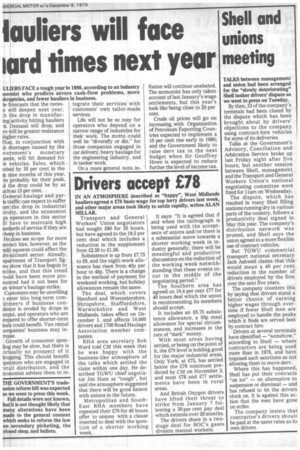Shell and unions meeting
Page 5

If you've noticed an error in this article please click here to report it so we can fix it.
TALKS between management and union had been arranged for the "slowly deteriorating" Shell tanker drivers' dispute as we went to press on Tuesday.
By then, 33 of the company's terminals had been closed by the dispute which has been brought about by drivers' objections to the company using contract-hire vehicles for some of its deliveries.
Talks at the Government's Advisory, Conciliation and Arbitration Service broke up last Friday night after five hours; but another session between Shell, management and the Transport and General Workers Union's national negotiating committee were fixed for llam on Wednesday.
The dispute, which has resulted in many Shell filling stations running dry in various parts of the country, follows a productivity deal signed in May this year. The company's distribution network was pruned, and Shell says the union agreed to a more flexible use of contract vehicles.
But TGWU commercial transport national secretary Jack Ashwell claims that this would mean a 40 per cent reduction in the number of drivers employed by the firm over the next five years.
The company counters this by saying that drivers stand a better chance of earning higher wages through overtime if fewer Shell men are employed to handle the peaks which it finds are served best by contract hire. Drivers at several terminals have identified — "somehow," according to Shell — where contractors are being used more than in 1978, and have imposed such sanctions as not allowing them to move derv.
Where this has happened, Shell has put their contracts "on ice" — an alternative to suspension or dismissal — and has refused to let the drivers clock on. It is against this action that the men have gone on strike.
The company insists that contractor's drivers shoulc be paid at the same rates as its own drivers.
























































































































































